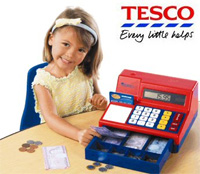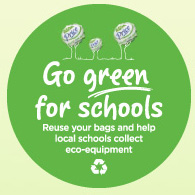Schools around the world engage in coupon-redemption programs. These are schemes whereby marketers increase their sales by offering schools computer equipment or other ‘free’ gifts in return for a certain number of cash register dockets from the participating store collected by pupils, parents and teachers.

In the US grocery and department  store rebate programs run in nearly all school districts and coupon redemption programs in most elementary schools.
In Canada 30 percent of schools are involved in coupon redemption schemes, particularly elementary schools except in Quebec, where legislation prevents contributions to schools being tied to the purchase of goods and services.
store rebate programs run in nearly all school districts and coupon redemption programs in most elementary schools.
In Canada 30 percent of schools are involved in coupon redemption schemes, particularly elementary schools except in Quebec, where legislation prevents contributions to schools being tied to the purchase of goods and services.
For example Apple Computers has operated a number of such schemes in conjunction with supermarket chains in the US and Australia and W H Smith and Boots introduced promotions involving donations of school equipment in return for shopping purchase vouchers in the UK.

Reference: ‘Campbell's Labels for Education’, Campbell's, 2007.
Equipment is donated to schools in return for soup labels in both the US and Canada. Campbell’s claims that 75,000 schools and organizations, covering 42 million students, have taken part.

Reference: Box Tops For Education, ‘All About Box Tops’, General Mills, 2007
Schools in the US earn cash by clipping box tops from a range of General Mills products such as Cheerios cereal and those of other participating corporations. They can also earn cash by shopping online from The Box Tops Marketplace or other partner websites or by making purchases with a Box Tops for Education Visa card.

Reference: ‘Box Tops for Books’, Nestlé, 2007 Children collect tokens from the tops of Nestlé cereal and cereal bar boxes. Thousands of schools in the UK participate. Walkers’ Books for Schools 
Reference: ‘Walkers Snacks Ltd - Free Books for Schools’, Business in the Community, 2006.
The scheme offers books in exchange for hundreds of tokens from Walkers’ crisp packets. By 2004 36,000 schools and nursery schools in the UK (85 percent of them) had taken part. “The programme caused a huge collecting frenzy never witnessed before, reaching over 80% of the population”.

Reference: ‘Flora Cooking with Schools’, 2009.
Flora gives free cooking equipment to primary schools in the UK in return for tokens from packs of Flora margarine.

Reference: ‘Computers for Schools’, Tesco, 2007; ‘What Better Marketing Could a Store Ask For?’ The Ecologist, September 2004, p. 54; CCFE, ‘Scheme Evaluation Card. Tesco: Computers for Schools 2006’, Campaign for Commercial-Free Education.
30,000 schools take part in the UK and Ireland. School children, parents and teachers collect vouchers for money spent at Tesco supermarkets to earn computers – complete with Tesco logo – for their school. Tesco advertises its scheme on national television and suggests on its website that parents set up collection points at their workplaces, that school classes compete to collect the most vouchers and that the vouchers be used in maths class for counting practice.

Reference: Sue Lowe, ‘Schools' Dud Giveaways Eat Computer Budgets’, Sydney Morning Herald, 5 December, 2002, p. 9.
Shoppers at Westfield Shopping Centres in Australia could exchange shopping receipts for points vouchers that they lodged in barrels for particular schools. The three schools with the most points won computers for their schools. Students, parents and teachers can earn points by spending money at Woolworths Australia. The points can then be used by schools to redeem educational resources (see advertisements). |

 Companies taking part in such schemes not only encourage sales of their products, but gain favourable publicity and community goodwill for their ‘philanthropy’, which comes at a very small cost. For example, Tesco’s corporate objectives in running its Computers for Schools scheme include enhanced corporate profile in the community, improved customer loyalty, recognition as an innovative retailer and increased sales.
Companies taking part in such schemes not only encourage sales of their products, but gain favourable publicity and community goodwill for their ‘philanthropy’, which comes at a very small cost. For example, Tesco’s corporate objectives in running its Computers for Schools scheme include enhanced corporate profile in the community, improved customer loyalty, recognition as an innovative retailer and increased sales.
ADSA Go Green for Schools campaign seeks to align the supermarket in the UK with environmental responsiiblity when they give shoppers vouchers for using reusable bags when shopping at ADSA that can be collected for "eco-equipment" for schools.
The children associate the brand with getting ‘free’ equipment for their school and both parents and children become promoters for the company in their efforts to collect dockets or vouchers. In the meantime, there is less pressure on governments to fund schools adequately so they can afford to buy the computing and sports equipment they need. In effect the children become promoters for the retailer and the retail outlet makes big profits.

The children sometimes harass shoppers for their dockets in the stores and car parks: “We are making beggars of our children” an official of the NSW Teachers Federation said of such a scheme involving Apple and Coles supermarkets.
Many of these promotion schemes, encourage children and their families to eat fatty, salty snacks for the sake of the school. Moreover, the returns to schools are very small.

For example, teachers and librarians involved in collecting and submitting coupons for Walkers’ Books for Schools scheme in the UK, generally found that the time and effort was not worth it for the disappointing assortment of books they received. They claimed that the choice of books was limited and included “old titles and unsuitable texts”.

Similarly Australian families spent $82 million in 2001 at Westfield Shopping Centres in return for $1 million worth of Packard Bell computers. Winning schools later complained that the computers were defective and many broke down after their warranties expired.

UK families spent £110,000 at Tesco supermarkets in return for a single computer.

A study of one of the US supermarket chain/computer deals found that the value of the computers ‘given’ to schools came to less than three quarters of a cent per dollar worth of receipts.
If you have any examples or updates you would like to contribute please email them to me and I will add them here. Please give references for where you sourced the information.